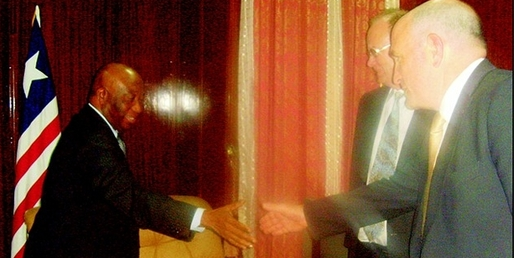
Liberian Observer | 12 Jan 2010
By George D. Kennedy
MONROVIA – Indonesian global palm oil giant, Golden Agri-Veroleum, and the Inter-ministerial Concession Committee (IMCC) of the Government of Liberia (GOL) have began negotiating what could be the biggest investment in Liberia’s agriculture industry.
Veroleum has applied to invest more than US$1.6 billion dollars on more than 240,000 hectares of oil palm to boost the country’s oil palm sector.
If approved, the investment will take place in southeastern Liberia, specifically in Sinoe, Grand Kru and Maryland counties.
Golden Agri Resources is the largest palm oil operator in Indonesia and the second largest in the world, with operations in China.
The company belongs to the Sinar Mas Group, one of the leading business groups in Indonesia, with major assets in pulp and paper, palm oil, property and telecom. GoldenVeroleum is also a member of the Singapore listed Golden Agri-Resources Company in Asia.
Last week, the company sent a high-powered delegation to Liberia to follow up on last year’s discussion with a Liberian IMCC delegation that visited Indonesia.
Upon arrival into the country, the Indonesian investors met with Liberia’s Vice President, Joseph N. Boakai, at his Capitol Hill offices in Monrovia.
The Vice President said the proposed investment would provide the needed employment opportunities in southeastern Liberia.
A statement issued by Boakai's office on January 5, 2010, noted his observation that the southeast has attractive investment opportunities and prospects, and that the Golden Veroleum investment will be a very positive one for Liberia.
“Employment and job creation have been difficult in the southeast; so we are very keen on this investment. You have our full support,” Boakai assured the Golden Veroleum officials. “Despite all problems we are confronted with, we are definitely committed to addressing the critical challenges in the southeast,” he added.
Briefing the Liberian Vice President, the head of the delegation, Matt Karinen said his company’s vision for Liberia is to cultivate over 240,000 hectares of oil palm in Grand Kru, Sinoe and Maryland Counties, (including 40,000 hectares via out growers), with the goal of producing more than one million tons of palm oil per annum.
He said the company will provide direct employment for an estimated 40,000 persons, as well as develop infrastructure, train out growers and provide them low cost seedlings for cultivation and production of final brand of consumer products for local consumption and export to Economic Community of West African States (ECOWAS) countries.
“The investment will also fully follow the government’s environmental master plan and standards,” Karinen assured the Liberian Vice President.
He disclosed that Veroleum will need to use the rehabilitated ports of Greenville and Harper for the export of oil palm products and import of needed materials.
The Veroleum official expressed optimism that his company as well as other palm oil producing entities such as Equatorial Palm Oil and Sime Darby can transform Liberia into one of the major producers of palm oil in the world for export and to meet domestic needs.
Karinen and his colleague, David Rothschild, were in the country last week holding discussions with officials of the Ministry of Agriculture, Environmental Protection Agency, National Investment Commission (NIC) and other relevant government agencies.
In remarks during the meeting, Rothschild said he was impressed with the transformation taking place in post-war Liberia, noting that he has seen considerable increase in building and in commercial ventures in the capital since he started coming to the country about 15 months ago.
They expressed optimism that the company would begin operations in Liberia in six months, and hoped the legislature would speed up ratification of their concession agreement.
Karinen pledged that his company would forge a symbiotic (mutually beneficial) relationship with small farmers (otherwise known as out growers), training them, supplying them low cost seeds and other materials and integrating them in farmer cooperatives while providing them with loans.
He also challenged the Liberian government to take advantage of the country’s rich soil and ideal climate to transform the lives of its citizens as has been the case in Indonesia and Malaysia.












